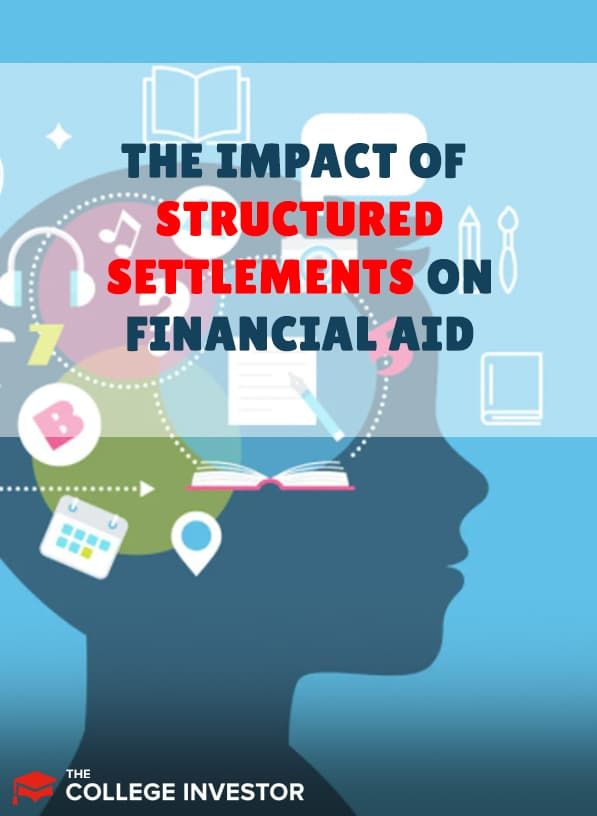
Eligibility for need-based financial aid depends on the student’s demonstrated financial need. Structured settlements can change how a student's financial aid is evaluated.
Financial need is the difference between the college’s annual Cost of Attendance (COA) and the student’s Expected Family Contribution (EFC).
In some cases, a structured settlement can be used to shelter settlement money from student financial aid formulas. But ultimately the timing of the payments will determine how structured settlements impact financial aid applications. We break down the rules below to help you plan.
How A Student's Financial Need Is Evaluated
The Expected Family Contribution (EFC) is based on:
- The student’s income and assets
- The parents’ income and assets
- Family size
- Number of children in college.
This information is reported on financial aid application forms, such as the:
- Free Application for Federal Student Aid (FAFSA): Used to apply for financial aid from the federal government, state governments and most colleges and universities.
- CSS Profile: A supplemented financial aid application form used by less than 200 colleges for awarding the college’s own financial aid funds.
Assets
Assets are reported as of the date the FAFSA is filed.
Student assets increase the EFC by 20% of the net asset value (NAV) on the FAFSA and 25% of the net asset value on the CSS Profile.
Parent assets increase the EFC on a bracketed scale. The increase can be up to 5.64% of the NAV on the FAFSA and up to 5% of the NAV on the CSS Profile. Note that the net asset value of parent assets is reduced by an asset protection allowance. And if the parent income is less than $50,000, it may also be disregarded by the simplified needs test on the FAFSA.
Income
Starting with the 2017-18 academic year, income reported on the FAFSA has been based on the prior-prior year. For example, the 2022-23 FAFSA is based on income from 2020.
Because income is reported from the prior-prior year, any distributions that are received on or after January 1 of the sophomore year in college will not be reported on the FAFSA, if the student graduates within four years. If it takes the student longer to graduate, the income might have an impact.
Which Assets Are Reported On The FAFSA?
To understand how structured settlements can impact financial aid, it's important to first understand the FAFSA's asset reporting rules. Some assets are reported on the FAFSA and some aren't.
The Higher Education Act of 1965 defines “assets” at 20 USC 1087vv(f) as including “cash on hand, including the amount in checking and savings accounts, time deposits, money market funds, trusts, stocks, bonds, other securities, mutual funds, tax shelters, qualified education benefits …, and the net value of real estate, income producing property, and business and farm assets.”
The net worth of an asset is the current market value reduced by the outstanding balance on any debts secured by the asset.
Excluded Assets
Certain types of assets are excluded from the definition of assets, such as money in qualified retirement plans, the net worth of the family’s principal place of residence, family farms and small businesses owned and controlled by the family.
Annuities
The FAFSA Instructions specify that annuities are excluded, but only as a type of retirement plan, such as a qualified annuity. Note that such retirement plans have restrictions on distributions prior to the beneficiary reaching retirement age (e.g., age 59-1/2), such as a 10% tax penalty on early distributions.
The Federal Student Aid (FSA) Handbook, a source of subregulatory guidance to college financial aid administrators published by the U.S. Department of Education, provides additional detail in a list of excluded assets on pages AVG-23 and AVG-24 of the Application and Verification Guide (AVG):
"The value of retirement plans — 401(k) plans, pension funds, annuities, noneducation IRAs, Keogh plans, etc. — also is not counted as an asset, but distributions do count as income... Similarly, the cash value or equity of a whole life insurance policy isn’t reported as an asset, but an insurance settlement does count as income....An exception to reporting pension distributions is when they are rolled over into another retirement plan in the same tax year."
The CSS Profile draws a similar distinction between qualified and non-qualified annuities. Qualified annuities are not reported as assets on the CSS Profile, but non-qualified annuities are reported. The CSS Profile’s instructions specify that “Investments include … non-qualified (non-retirement) annuities …”
Payments from qualified and non-qualified annuities are reported as income on the FAFSA and CSS Profile. They are included in adjusted gross income (AGI) if the payment is taxable and reported as untaxed income if not. AGI and untaxed income are added to yield total income and thus have the same impact on eligibility for need-based financial aid.
Trust Funds
Trust funds are included in the statutory definition of assets. The FSA Handbook states on page AVG-21 that these are generally reportable assets:
“Trust funds in the name of a student, spouse, or parent should be reported as that person’s asset on the application, generally even if the beneficiary’s access to the trust is restricted. If the settlor of a trust has voluntarily placed restrictions on its use, then the student should report its present value as an asset, as discussed below.”
However, the FSA Handbook specifies several circumstances in which a trust fund will not be reported as an asset:
- Trust funds that have been restricted by court order. The FSA Handbook gives an example of such a restricted trust as “one set up by court order to pay for future surgery for the victim of a car accident.”
- Assets where ownership is currently being contested (e.g., contested assets in a divorce or separation, a testamentary trust where the will is being contested). Once ownership of the asset is resolved, it will be reported as an asset on a subsequent FAFSA.
For example, if the student or parent is the beneficiary of a life insurance policy, the proceeds of the life insurance policy will not be reported as an asset until they are paid. Similarly, bequests from a will are not reported as assets until the estate settles.
How Structured Settlements Impact Financial Aid
The normal treatment of a lump sum settlement is to count it as income in the year received and as an asset to the extent that it is unspent as of the date the financial aid application form is filed. In addition, subsequent income from the asset will count as income on the FAFSA and CSS Profile.
Families can appeal for a more favorable treatment of the lump sum payment. Many college financial aid administrators will disregard the initial receipt of the lump sum settlement as income, because it is a one-time event that is not reflective of the family’s ability to pay for college during the academic year.
Nevertheless, the lump sum payment will still be counted as an asset, to the extent that it's unspent as of the date the FAFSA or CSS Profile is filed. Financial aid administrators sometimes refer to this situation as "double-counting" of the lump sum settlement as income and as an asset. Also, subsequent income earned from investing the lump sum will be reported as income on these forms.
However, a structured settlement can potentially shelter the settlement on the FAFSA and CSS Profile. If a settlement is provided in a structured settlement, it will not be reported as income or as an asset in the year received.
Why Structured Settlements Are Temporarily Sheltered On The FAFSA
Why do structured settlements temporarily have no impact on financial aid? It's not because of the use of an annuity in funding the payments. Non-qualified annuities must be reported as assets on the FAFSA and CSS Profile. It's also not because of the tax-free status of the structured settlement.
Rather, a structured settlement is sheltered because the restrictions were placed on the structured settlement by a third party, such as a court, and not by the family. This exception applies even if the family had a role in negotiating the structured settlement. And this is particularly true when the structured settlement is intended to pay for future medical expenses of an accident victim.
Why The Timing Of Structured Settlement Payments Matters
It's important to mention again that the sheltered status of a structured settlement only applies to the year it is received. Subsequent payments from the structured settlement will still count as income. The timing of these payments may have an impact on eligibility for need-based financial aid.
For example, some structured settlements will make four annual payments after the child turns 18. Since this can overlap with the child’s college years, these payments can affect the child’s eligibility for need-based financial aid. This is especially a risk if the payments occur before the family files the FAFSA and CSS Profile forms.
If the payments start before or when the child is enrolled in college, some college financial aid administrators may decide to treat the future stream of payments as an asset if:
- The use of those payments is not restricted, or
- If the structured settlement lists paying for college as a permitted purpose
College financial aid administrators might also consider a structured settlement as an asset if it can be sold or borrowed against without requiring court approval (most can't). Thus, in some cases, it may be beneficial to delay any payments from the structured settlement until after the child graduates from college.
Changes Are Coming With FAFSA Simplification
Soon, structured settlements may impact financial aid even less often. The Consolidated Appropriations Act, 2021 simplifies the FAFSA starting with the 2024-25 academic year. Among many other changes, the simplified FAFSA will drop the cash support question. This question is used to report untaxed income to the student.
If the payments from a structured settlement are tax-free (as is usually the case in situations involving the payment of damages due to injury, illness or wrongful death) then the payments will no longer be reported on the FAFSA, starting with the 2024-25 FAFSA.
Of course, FAFSA changes do not affect the CSS Profile. So tax-free structured settlement payments may still be reported as untaxed income on that form. And in the less-common cases that the payments are taxable, they will continue to be reported in AGI on both the FAFSA and CSS Profile.

Mark Kantrowitz is an expert on student financial aid, scholarships, 529 plans, and student loans. He has been quoted in more than 10,000 newspaper and magazine articles about college admissions and financial aid. Mark has written for the New York Times, Wall Street Journal, Washington Post, Reuters, USA Today, MarketWatch, Money Magazine, Forbes, Newsweek, and Time. You can find his work on Student Aid Policy here.
Mark is the author of five bestselling books about scholarships and financial aid and holds seven patents. Mark serves on the editorial board of the Journal of Student Financial Aid, the editorial advisory board of Bottom Line/Personal, and is a member of the board of trustees of the Center for Excellence in Education. He previously served as a member of the board of directors of the National Scholarship Providers Association. Mark has two Bachelor’s degrees in mathematics and philosophy from the Massachusetts Institute of Technology (MIT) and a Master’s degree in computer science from Carnegie Mellon University (CMU).
Editor: Clint Proctor Reviewed by: Robert Farrington
